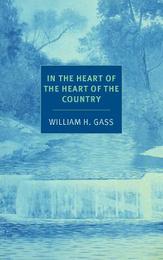
|
In The Heart Of The Heart Of The...
Paperback / softback
Main Details
| Title |
In The Heart Of The Heart Of The...
|
| Authors and Contributors |
By (author) William H. Gass
|
| Physical Properties |
| Format:Paperback / softback | | Pages:272 | | Dimensions(mm): Height 203,Width 128 |
|
| Category/Genre | Classic fiction (pre c 1945)
Short stories |
|---|
| ISBN/Barcode |
9781590177648
|
| Classifications | Dewey:FIC |
|---|
| Audience | |
|---|
| Edition |
Main
|
|
Publishing Details |
| Publisher |
The New York Review of Books, Inc
|
| Imprint |
NYRB Classics
|
| Publication Date |
4 November 2014 |
| Publication Country |
United States
|
Description
First published in 1968, In the Heart of the Heart of the Country established William Gass as one of America's finest and boldest writers of fiction, and nearly fifty years later, the book still stands as a landmark of contemporary fiction. The two novellas and three short stories it contains are all set in the Midwest, and together they offer a mythical reimagining of America's heartland, with its punishing extremes of heat and cold, its endless spaces and claustrophobic households, its hidden and baffled desires, its lurking threat of violence. Exploring and expanding the limits of the short story, Gass works magic with words, words that are as squirming, regal, and unexpected as the roaches, boys, icicles, neighbors, and neuroses that fill these pages, words that shock, dazzle, illumine, and delight.
Author Biography
WILLIAM H. GASS (b. 1924) is an essayist, novelist, and literary critic. He grew up in Ohio and is a former professor of philosophy at Washington University. Among his books are six works of fiction and nine books of nonfiction, including On Being Blue (1976; published as an NYRB Classic), Tests of Time (2002), A Temple of Texts (2006), and Life Sentences (2012). Gass lives with his wife, the architect Mary Gass, in St. Louis. JOANNA SCOTT's most recent novel is De Potter's Grand Tour. Her other books include the novels Arrogance, The Manikin, and Follow Me and the story collections Various Antidotes and Everybody Loves Somebody.
ReviewsThe prose reads fast, but you return to the sentences often because you can't believe what you have just read, so weirdly apt are the metaphors ... this collection was first published in 1968, but it's timeless. The Guardian In the Heart of the Heart of the Country defines Gass not as a special but as a major voice. We read about the becalmed Midwest, about farmers mired in their dailiness, and realize too late that we've been exposed to a deadly poetry. It says that America is lost. No writer I've ever read, not even Joyce, can celebrate his world with a more piercing sadness. -- Frederic Morton, The New York Times The man has never written a sentence that isn't astonishing -- Benjamin Weissman, Salon Omensetter's Luck seemed the kind of astonishing total performance that might not lead to another book. But this new volume shows a growth and an exploration of imaginative power suggesting that Mr. Gass's work is here to continue, as well as to stay. In the title piece, as throughout, the treatment of the relation between self and things is unique in American writing. -- John Hollander William Gass is, in his own way, quite as successful as Joyce or Faulkner. Shaun O'Connell, The Nation William H. Gass has recreated a mythical Midwest that overpowers all his characters and has a palpable, frightening presence...[he] makes us doubt everything in the story-Jorge, the Pedersen kid and our very existence-as he lulls us to sleep with his crisp, hallucinatory prose. Jerome Charyn, The Wall Street Journal [He is] one of the important writers of his generation. This collection...serves to focus the distinctive qualities of his sensibility and style...Gass is "old-fashioned" in his insistence that language is an immediate extension of human feeling and cognition. But what makes him modern is how much he knows-like John Barth, Thomas Pynchon, and Walker Percy, he is one of the philosopher-novelists who bring a new intellectual power to the basically transcendental American sensibility. It is writing like this that will achieve, if it is at all possible, a saving continuity with tradition as it attempts to save human feeling and individuality for art. Newsweek These stories scrape nerve and pierce the heart. They also replenish the language. They are told sparely, hauntingly, with compassion and a remarkable exploratory courage. The New York Times Sentences sweet as Godiva Chocolate, turns of phrase so luscious they verge on the lubricious, paragraphs one could live on-anyone who savored the prose of William Gass will remember it with pleasure or heartburn. The Washington Post Book World
|